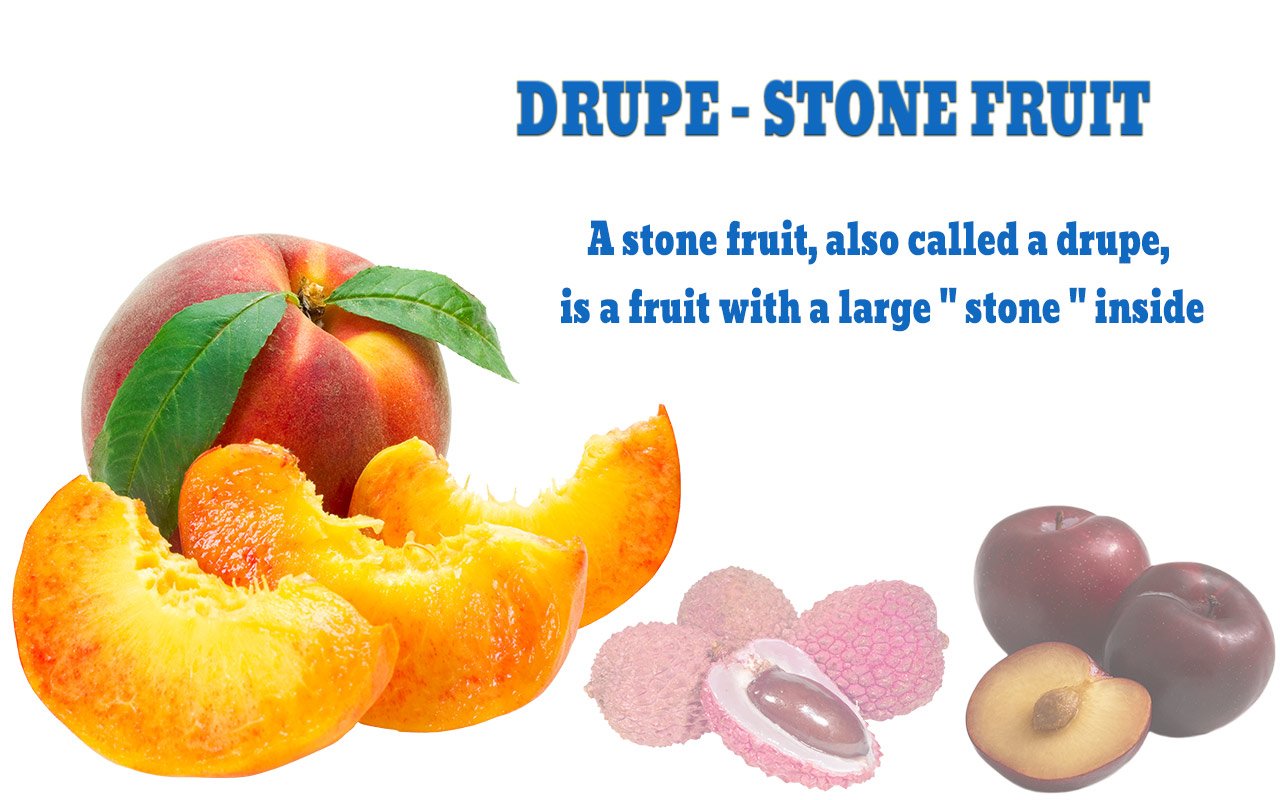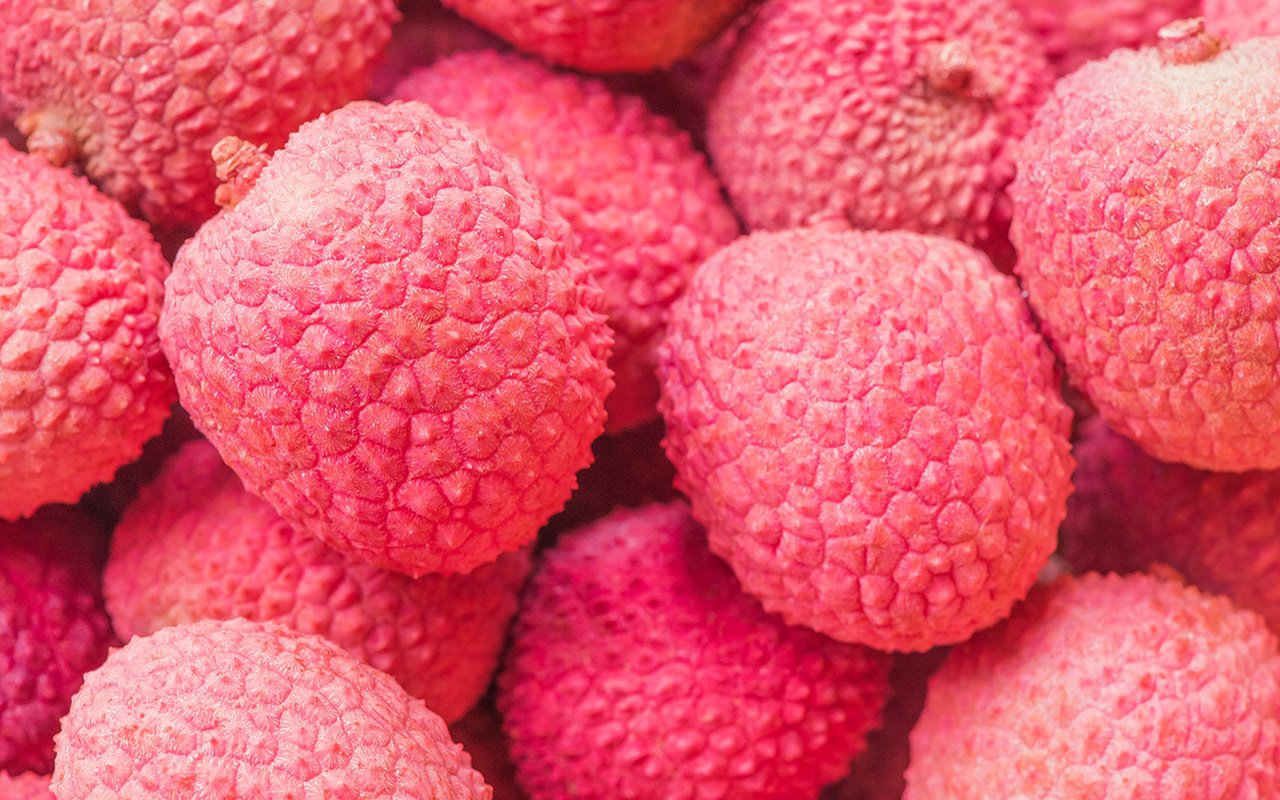Peaches, plums, and cherries all have one thing in common. They are all stone fruits. Stone fruits or drupes are fruits with a pit or “stone”, in the middle of their soft, juicy flesh. They are highly nutritious and have a variety of health benefits.
All stone fruits, including cherries, plums, and lychees offer a wealth of nutrients that can be beneficial to your health in many ways.
They are delicious and versatile. You can enjoy the whole or add them to sweet and savory recipes.
To improve your overall health and satisfy your sweet tooth, you can add a few of these stone fruits to your diet.
Table of Contents
What is a stone fruit?
Stone fruits are a fruit with a hard seed or pit in the middle. Or to make it easier to understand, you can understand that stone fruits, also called drupes, is a fruit with a large “stone” inside. These are some examples of stone fruits:
- Apricots
- Cherries
- Nectarines
- Peaches
- Plums
Stone fruits do not ripen immediately after being picked. This is a difference from other fruits. Different varieties ripen at different times so it is easy to find different types throughout the year.
Many fruits can be classified as stone fruits botanically. These include familiar favorites like raspberries, plums, and peaches as well as less-common varieties such as green almonds. They are a green stone fruit known for their fuzzy outer shell.
As with other fruits, stone fruit lists are a great source of vitamins, minerals, and antioxidants. They can help improve bone health, weight loss, immune function, and many other things.
Benefits of Stone Fruits
The best news for your health is that cherries, peaches, nectarines, and apricots are now in season. Stone fruits are rich in vitamins A, C, and E as well as dietary fiber, potassium, and antioxidants. These vibrant fruits are great for smoothies, salads, desserts, or simply savoring them as they are.
- 1. Stone fruits can increase your immunity.
- 2. Stone fruits can help create collagen.
- 3. Healthy nerves and muscles.
- 4. Combat obesity and diabetes.
- 5. Improve eyesight.
- 6. Encourage healthy digestion.
- 7. Strengthen your bones and teeth.
- 8. They can improve your skin
- 9. They lower blood pressure
- 10. They prevent disease
Stonefruit allergy symptoms
Most people notice symptoms of allergy within minutes after eating a stone fruit. Rarely, however, a reaction can occur up to an hour later.
Itching and swelling following the consumption of raw stone fruits are the most common symptoms of stone fruit allergies. These symptoms can be found in the following areas:
- Face
- Lips
- Mouth
- Throat
- Lingual
More severe reactions may involve the skin, respiratory system, or digestive tract. These symptoms can include:
- Cough
- Diarrhea
- Itchy, runny, or itchy nose
- Skin rash
- Vomiting
Stone fruits that have been prepared in a way other than cooking, canning, or made into syrups or juices are unlikely to cause an allergic reaction. For people suffering from severe stone allergy, however, any stone fruit product can trigger a reaction.
Anaphylaxis
Anaphylaxis is the most severe form of allergic reaction. Anaphylaxis is a reaction that occurs within minutes after eating a food item. It can also include:
- Dizziness
- Fainting
- Skin that is pale or flushed
- Itching and hives
- Hypotension (low blood pressure).
- Nausea or vomiting
- A quick pulse, which may be weak
- Breathing difficulties can be caused by swelling in the throat, airways, and tongue.
Top 6 healthy and delicious stone fruits
Cherries
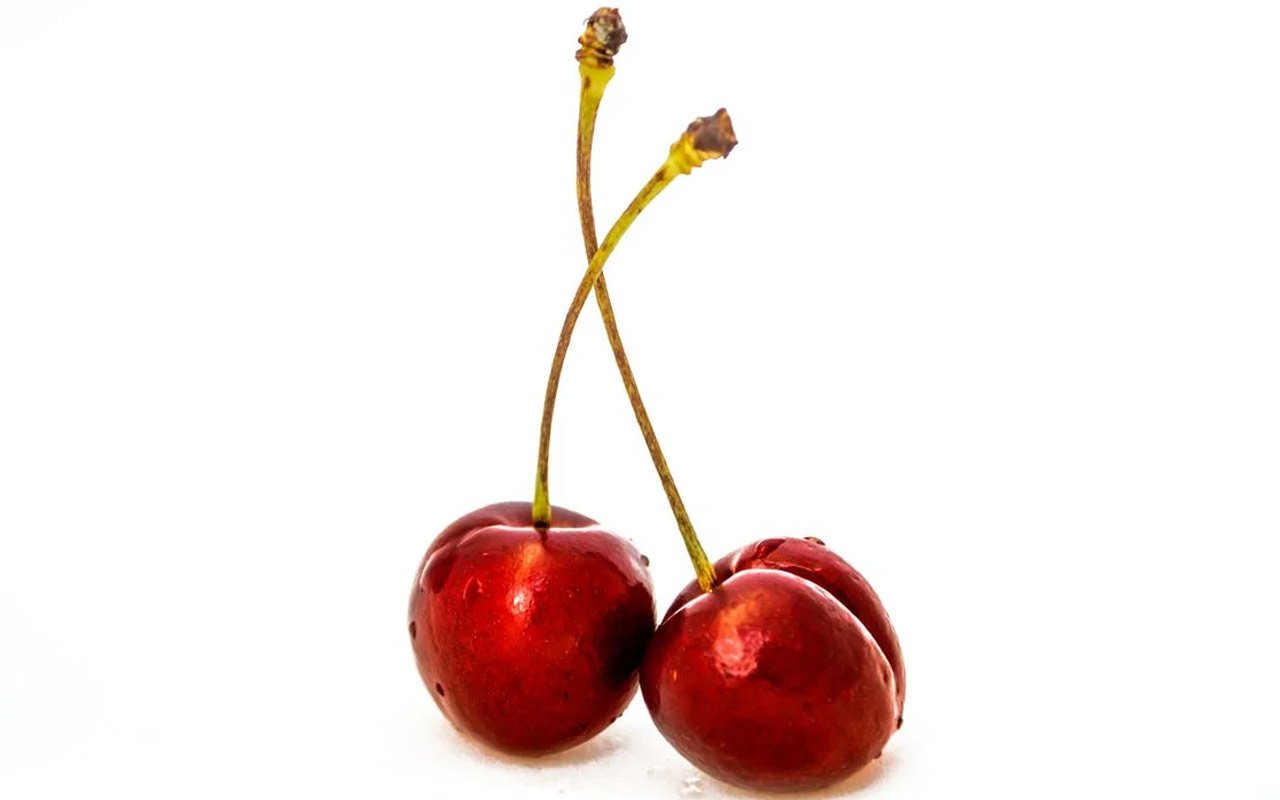
Cherries are a very popular fruit. Cherries are not only delicious, but they also contain powerful health benefits, such as vitamins, minerals, plant compounds, and other nutrients. Here are seven amazing health benefits from cherries:
- Filled with nutrients
- High in antioxidants, anti-inflammatory, and other compounds
- Can boost exercise recovery
- It may benefit heart health
- Gout and arthritis symptoms may be improved.
- May improve sleep quality
- It’s easy to include in your diet
Because of their rich color and sweet flavor, cherries are one of the most beloved varieties. Cherries are not only delicious but also rich in vitamins, minerals, and powerful plant compounds.
One cup (154g) of fresh, pitted cherries
- Calories: 97
- Carbs 25g
- Protein: 2 grams
- Fat 0 Grams
- Fiber: 3 Grams
- Vitamin C 18% Reference Daily Intake (RDI).
- Potassium 10% RDI
Cherries are a great source of manganese and copper as well as vitamins B6 and K. They also contain powerful antioxidants like anthocyanins and procyanidins. Flavonols and hydroxycinnamic acid.
These antioxidants have many important functions in your body. They protect your cells against damage from molecules known as free radicals and reduce inflammation processes that could increase your risk for certain chronic diseases.
A 28-day study of 18 people showed that those who ate less than 2 cups (280g) of cherries daily had significant decreases in inflammation markers, such as C-reactive Protein (CRP), interleukin 18(IL-18), and endothelin-1.
High levels of inflammation markers such as CRP have been linked to an increased risk for certain conditions like heart disease, neurodegenerative diseases, and type 2 diabetes. It is crucial to reduce inflammation for your health.
Some studies have shown that cherries can improve sleep quality, regulate blood sugar levels and reduce muscle soreness after exercise, high cholesterol levels, and blood pressure.
Cherries are extremely healthy and versatile. Cherries can be eaten fresh or prepared in a wide variety of sweet and savory dishes.
Peaches

Peaches, or Prunus Persica, are small fruits with fuzzy skin and sweet yellow or white flesh. Peaches are believed to have originated in China over 8,000 years ago. Peaches can be related to cherries, plums, and apricots. Because their flesh is enclosed in a shell that contains an edible seed, they are called drupes or stone fruits.
Peaches can be eaten as a snack or added to many dishes. Peaches are healthy and can provide many health benefits including better digestion, smoother skin, and allergy relief.
These are just a few of the surprising health benefits of peaches.
- Filled with Nutrients & Antioxidants
- May Aid Digestion
- May Improve Heart Health
- May Protect Your Skin
- It may prevent certain types of cancer
- May Reduce Allergy Symptoms
- May boost immunity
- Protects against some toxins
- May reduce blood sugar levels
- Peaches are very easy to find, and you can add them to your diet in many different ways.
Peaches are stone fruits that taste delicious and have been grown all over the globe since 6,000 BC.
They are prized for their tasty taste and a variety of health benefits. These sweet stone fruits are high in nutrients and low in calories. One large (75-gram) peach contains:
- Calories: 68
- Carbs 17 Grams
- Protein: 2 gram
- Fat 0 Grams
- Fiber: 3 Grams
- Vitamin D: 19%
- Vitamin A 11% RDI
- Potassium 10% RDI
Peaches also contain high levels of copper, manganese, and vitamins E (niacin), K, and beta carotene.
Carotenoids, which are pigments found in plants, give peaches their deep color. They are antioxidant and anti-inflammatory and can protect against certain types of cancer and eye diseases.
Research has shown that those who consume carotenoid-rich diets have a lower chance of developing AMD (age-related macular disease), which is an eye condition that can impair your vision.
Carotenoid-rich fruits like peaches can help protect against heart disease, type II diabetes, and other cancers including prostate cancer.
Peach peels can contain as much as 27 times the antioxidants of the fruit. For maximum health benefits, eat the peel.
Plums

Vitamin C found in plums can help your body heal, create muscle and form blood vessels. It is also great for your eyes.
There are many other health benefits that plums can bring to your body:
Heart disease.
The inflammation that causes heart disease is reduced by nutrients and phytochemicals in plums.
Anxiety.
An antioxidant called plums can help you avoid anxiety. Anxiety can spike if your antioxidants are low.
Constipation Relief.
Like prunes, plums can help to keep your system moving. Plums contain a lot of sorbitol which is a sugar alcohol that acts naturally as a laxative.
Stroke and high blood pressure.
Two ways potassium in plums can help with blood pressure control are: Potassium in plums helps to eliminate sodium from your body through urine and reduces tension in your blood vessels. Your chances of suffering a stroke are lower if your blood pressure is lower.
High in antioxidants.
These substances protect your body from cell and tissue damage which can lead to cancer, Alzheimer’s, Parkinson’s, and diabetes.
Lower blood sugar
The fiber in plums helps to slow down blood sugar spikes after eating carbs. You can increase your body’s production of adiponectin which helps regulate your blood sugar.
Bone health.
Studies on animals have shown that prunes (dried plums), may reduce bone loss and even reverse it.
Did you know:
Plums and cherries are closely related fruit. The cherry plum is a hybrid of plum and cherry. It is actually a small plum belonging to the same genus (Prunus) as cherry and plum. Cherry plums are edible fruits that grow in temperate areas of Asia, Europe, and North America.
Plums are sweet, juicy stone fruits that pack a lot of nutrients. Two plums of 66 grams each are enough to provide:
- Calories: 60
- Carbs 16 Grams
- Protein: 1 gram
- Fat 0 Grams
- Fiber: 2 Grams
- Vitamin A: 20% RDI
- Vitamin A 10% of RDI
- VitaminK:10% RDI
These fruits with jewel tones are rich in antioxidants such as proanthocyanidins or kaempferol.
Phenolic compounds can protect your cells against damage from free radicals. They may also reduce the risk of developing diseases such as heart disease and neurodegenerative conditions.
Prunes are dried plums that provide concentrated amounts of nutrients found in fresh plums. They can also be beneficial for your health in many ways.
Studies have shown that eating prunes can increase bone mineral density, reduce constipation, and lower blood pressure.
You can enjoy fresh plums on their own, or add them to recipes like oatmeal, salads, and yogurt. For a protein- and fiber-rich snack, pair prunes with almonds and other nuts and seeds.
Apricots
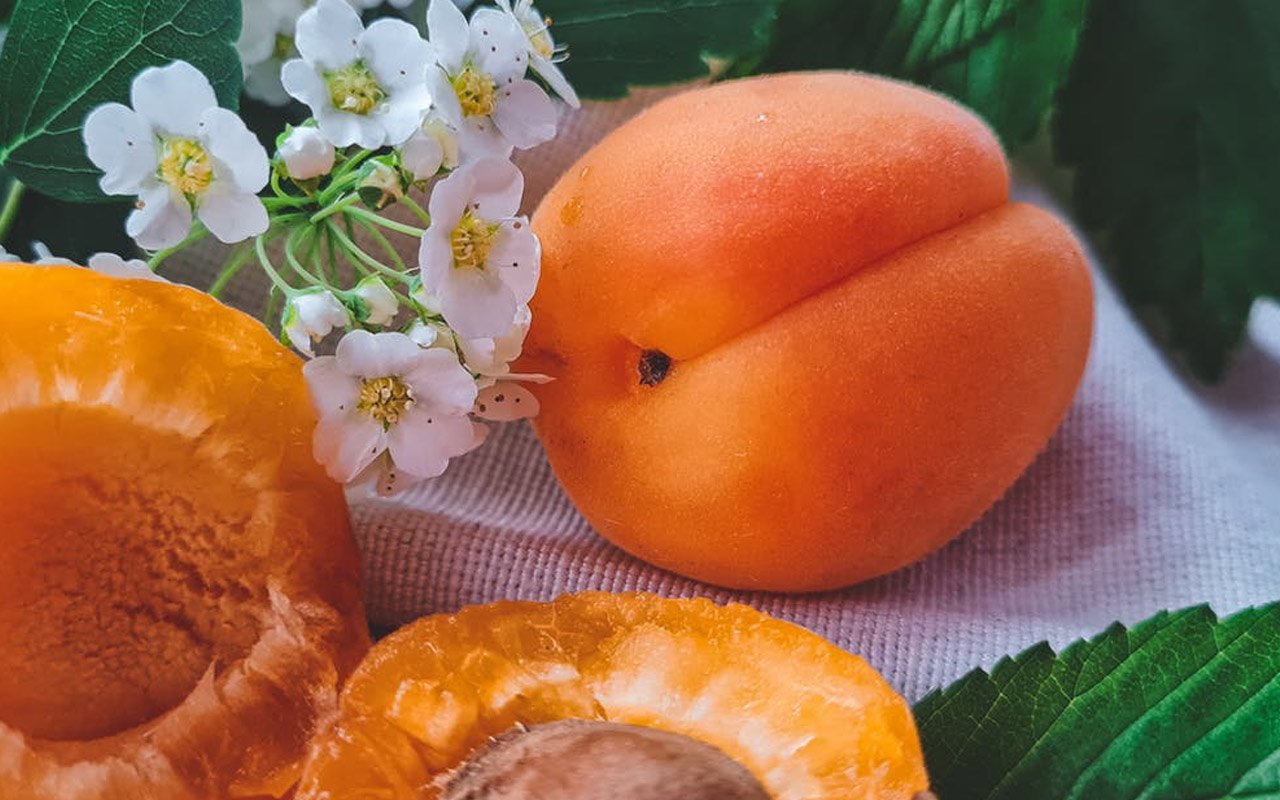
Apricots (Prunus armeniaca) are stone fruits also known as Armenian plums. They are round and yellow and look similar to a peach, but they have the tartness of purple plumbs. They are extremely nutritious and provide many health benefits such as better digestion and eye health.
Here are 9 benefits of Apricots for your health and nutrition.
- Very nutritious and low calories
- Antioxidants high
- May promote eye health
- May boost skin health
- May improve gut health
- Potassium is high
- Very hydrating
- May protect your liver
- It’s easy to include in your diet
Apricots, small orange fruits packed with nutrients and plant compounds that promote health, are small and easy to find.
One cup (165g) of sliced Apricots is sufficient:
- Calories: 79
- Carbs 19 Grams
- Protein: 1 gram
- Fat 0 Grams
- Fiber: 3 Grams
- Vitamin A: 27% RDI
- Vitamin A 64% RDI
- Potassium12%
These sweet fruits also contain a number of B vitamins as well as vitamins E, and K.
Beta carotene is a carotenoid that can be converted to vitamin A in the body. Apricots, both fresh and dried, are particularly rich in this carotenoid. This powerful pigment has many health benefits, and apricots can be a great way to reap its amazing health benefits.
Animal research has shown that apricots contain high levels of beta carotene and other powerful compounds from plants. This protects cells from oxidative damage caused by reactive molecules known as free radicals.
Apricots can also improve the speed at which food passes through your digestive system, possibly alleviating acid reflux.
One study of 1,303 patients with gastroesophageal acid reflux disease (GERD), found that people who ate apricots every day had better digestion and significantly fewer GERD symptoms than those who didn’t.
Apricots can be eaten as a snack or added to sweet and savory recipes like salads and baked goods.
Lychee
Lychees are considered to be a super fruit as studies have shown that they contain a lot of Vitamin C, polyphenol antioxidants, and important minerals like potassium and copper.
Lychees are rich in vitamins and minerals such as potassium and copper. These can help prevent heart disease, cancer, or diabetes
Lychee is a beautiful fruit that has many health benefits. It can help with weight loss, increase the immunity system, prevent cancer, boost digestion, build strong bones, and lower blood pressure. It also helps to protect against viruses.
9 Amazing Benefits of Lychee
- Increase your Immunity
- Aids Digestion
- Antiviral Tendencies
- Increases blood circulation
- Blood pressure regulation
- Good for the Skin
- Aid Weight Loss
- Anti-Inflammatory Agent
- For stronger bones
Lychee (or litchi) is a stone fruit that is highly prized for its unique flavor and texture. This stone fruit’s sweet, white flesh is protected by its pink, inedible, skin. It has a unique look.
Fresh lychees are available in a cup (190g)
- Calories: 125
- Carbs 31 Grams
- Protein: 2 grams
- Fat 1 Gram
- Fiber: 3 Grams
- Vitamin C 226% RDI
- Folate 7% RDI
- Vitamin A6:10% RDI
Lychees contain good levels of riboflavin, B2, phosphorous, potassium, and copper.
These stone fruits are particularly rich in vitamin C, which is a vital nutrient for your skin, immune system, and bones.
Additionally, lychees contain phenolic compounds such as rutin and epicatechin, gallic acid, caffeic acid, chlorogenic acid, and epicatechin. All of these compounds have powerful antioxidant properties.
Animal studies have shown that these compounds reduce inflammation and oxidative stresses, particularly in relation to liver damage.
A 21-day study in rats showed that consuming 91 mg of lychee extract per pound (200mg per kilogram) per day significantly reduced liver inflammation, cell damage, and free radical production. It also increased antioxidant levels such as glutathione.
Another study showed that rats suffering from the alcoholic liver disease who were given lychee extract for 8 consecutive weeks had significant liver oxidative stress reductions and improved liver function.
Lychee fruit can be eaten raw, peeled, or mixed into salads, smoothies, or oatmeal.
Mangoes

It’s easier to be healthier and have more fun doing it! Mango (Mangifera Indica) is a “king of fruits” in some parts of the globe. It is a drupe (or stone fruit), which means it has a large seed at the center.
Mango is a native of India and Southeast Asia. People have been cultivating it for more than 4,000 years. There are hundreds of varieties of mango, each with its unique taste, shape, size, and color. This delicious fruit also has a remarkable nutritional profile.
Studies show that mango and its nutrients have many health benefits. These include improved immunity and digestion. The risk of certain types of cancer might be reduced by some polyphenols in mango.
These are 10 Health Benefits of Mango:
- Filled with nutrients
- Low in calories
- It may help to prevent diabetes
- Healthy plant compounds high
- It contains immune-boosting nutrients
- Heart health support
- May improve digestive health
- May support eye health
- It may lower your chances of getting certain types of cancer.
- It’s versatile and easy to include in your diet
Mangoes, brightly colored tropical stone fruits, are loved around the globe for their sweetness and juiciness. There are many varieties, and all of them are very nutritious.
One mango (207 grams) provides
- Calories: 173
- Carbs 31 Grams
- Protein: 1 gram
- Fat 1 Gram
- Fiber: 4 Grams
- Vitamin A: 96% RDI
- Vitamin A 32% RDI
- Vitamin E12% of RDI
Mangoes, in addition to the nutrients mentioned above, are good sources of vitamin K, vitamin K, magnesium, and potassium.
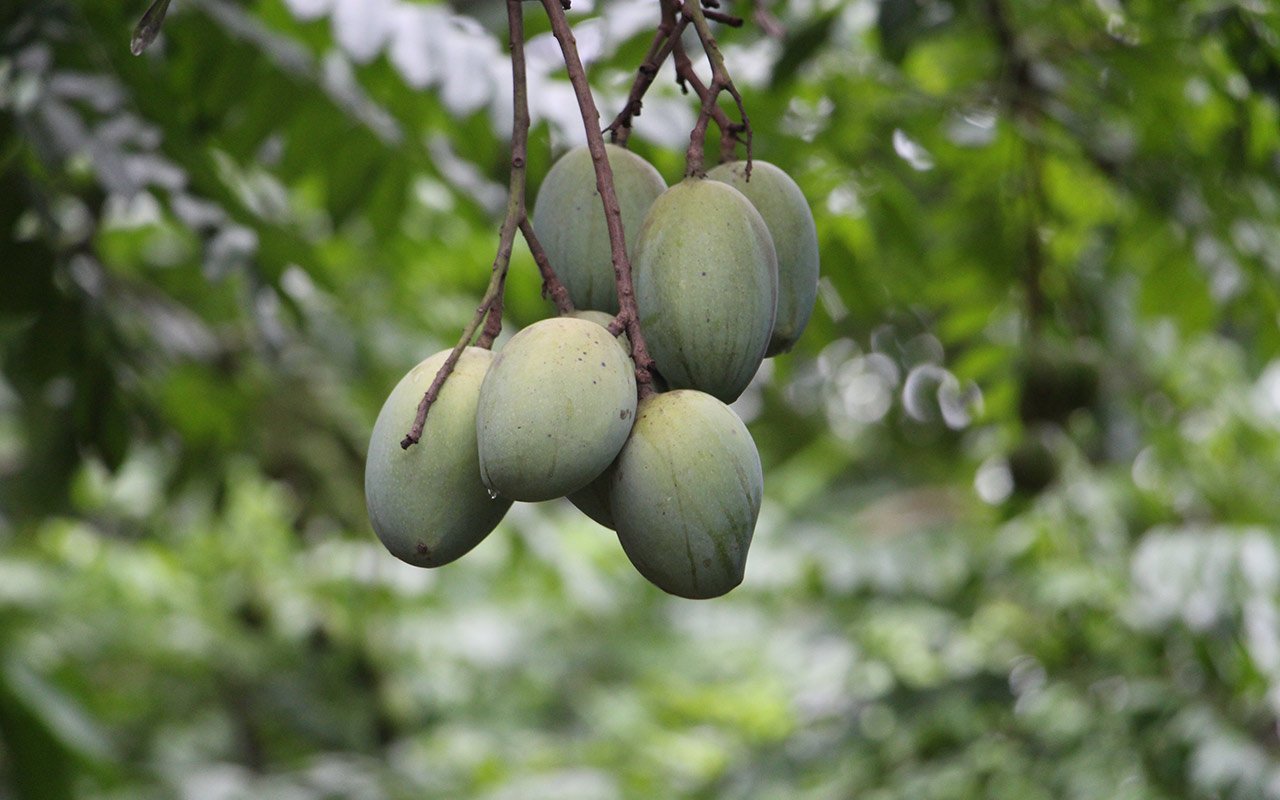
Mangoes, like other stone fruits, are rich in antioxidants such as anthocyanins and carotenoids and vitamins C, and E.
Although the peel of mango is often thrown away, research shows that it is very nutritious. It contains vitamins and minerals as well as fiber and antioxidants such as ellagic and kaempferol.
Mango is high in fiber, which has been proven to improve digestion.
In a study of chronic constipation patients, it was found that eating around 2 cups (300g) of mango per day significantly increased stool frequency and consistency. It also reduced intestinal inflammation markers.
Animal studies have also shown that mangoes can protect against certain cancers and bowel disorders. These potential benefits are still not confirmed by human research.
Mangoes are delicious fresh or in smoothies or fruit salads. They can also be topped with yogurt and oatmeal and made into delicious salsas.

